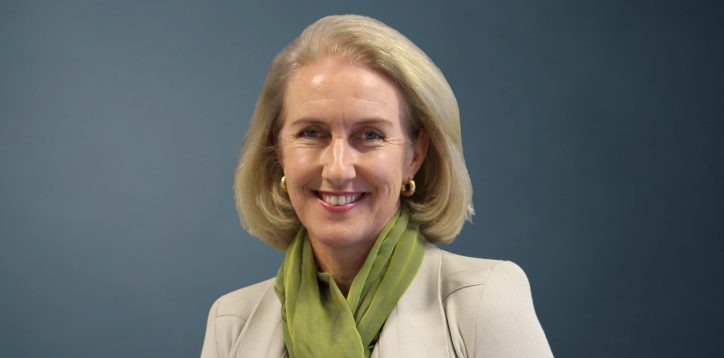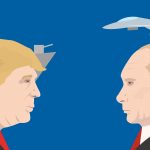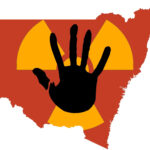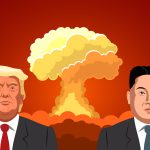UN Nuclear Weapons Ban Enters Into Force: An Interview With Dr Phoebe Wynn-Pope

Following the storming of the US Capitol Building on 6 January, members of congress called for measures to be taken to prevent outgoing president Donald Trump from launching a nuclear attack during his final days in office.
Not only does this reveal the chaotic political situation in the States, but it serves to shine a light on the very real threat that nuclear war continues to be.
Indeed, while the Cuban missile crisis, and the destruction of Hiroshima and Nagasaki have faded into the past, nuclear weapons still pose existential danger.
Renowned US political commentator Noam Chomsky has repeatedly warned over recent years that the two major threats to the existence of our species are global warming and the seven-decades-long potential there’s been for nuclear war.
And Chomsky’s not alone. In January 2020, the Bulletin of Atomic Scientists set the Doomsday Clock to 100 seconds to midnight. Based on the dual threats of nuclear war and climate, this is the closest the clock has ever been set to midnight – which signifies Armageddon – since its creation in 1947.
Towards elimination
But things are about to change on the nuclear front. This Friday, 22 January, marks 90 days since the 50th nation ratified the 2017 UN Treaty on the Prohibition of Nuclear Weapons, which means that nuclear weapons will be classed as illegal under international law.
Following 122 states voting in its favour, the treaty was adopted by the United Nations on 7 July 2017. The international agreement establishes a comprehensive set of prohibitions in terms of development, testing, production, acquisition, stockpiling and use.
Eighty six states have signed onto the treaty thus far, and 51 have now ratified it. However, Australia has done neither.
Currently, there are nine nations that possess nuclear weapons: the US, the UK, Russia, France, China, India, Pakistan, Israel and North Korea.
Unsurprisingly, these nuclear states have been resistant to the treaty. But its existence aims to change that stance. As with other weapons of mass destruction banned in the past – biological in 1972 and chemical weapons in 1993 – the aim is to eventually see nuclear weapons eliminated.
Promoting prohibition
Founded in Melbourne in 2007, ICAN (International Campaign to Abolish Nuclear Weapons) is a global coalition of civil society organisations, which has been instrumental in bringing about the creation of the treaty, promoting adherence to it and raising awareness about the nuclear threat.
Dr Phoebe Wynn-Pope has long been working alongside ICAN in ensuring that the treaty becomes a permanent part of international law. Having spent years working in humanitarian aid in conflict zones, Dr Wynn-Pope is currently head of business and human rights at Corrs Chambers Westgarth.
Sydney Criminal Lawyers spoke to Dr Wynn-Pope about the increasing impact that nuclear weapons being classed as illegal will have moving into the future, and the series of events celebrating the treaty entering into force that ICAN has planned nationwide this Friday.

Firstly, on 22 January, the 2017 UN Treaty on the Prohibition of Nuclear Weapons comes into force. This means nuclear weapons will be illegal under international law.
Dr Wynn-Pope, what’s the significance of this?
There are several things that make it really significant. First, it’s the last weapon of mass destruction to be declared illegal.
So, where other weapons – such as biological and chemical weapons – have already had treaties prohibiting them, nuclear weapons haven’t.
That’s extraordinary because it’s difficult to conceive of a situation where a nuclear weapon could be used consistently in line with international humanitarian law. So, that in itself is particularly significant.
The ban will increase the stigmatisation around nuclear weapons, which is another key element. The treaty says that it’s not okay to have nuclear weapons, to use them, to develop them or to rely on them.
If you think about biological weapons, most people would be repulsed by the idea of biological conflict, particularly when we’re sitting in the middle of a pandemic and suffering the consequences of a biological virus that’s out of control.
That’s a second important element. The other thing is that it’s a time when people can think again about the risks of nuclear weapons. We know there are 13,500 nuclear weapons around the world, with many of them on hair trigger alert – they’re ready to go.
Over the last 20 to 30 years, since the end of the Cold War, people have felt that the likelihood of the use of nuclear weapons is very low.
Even if that was true, the consequences of the use of nuclear weapons is so catastrophic that it just isn’t conceivable to base your security policy or your future on their not being used.
In making nuclear weapons illegal it puts a framework around those moral issues.
So, you would say that even though we don’t hear about nuclear weapons like we once did, they still pose a very real threat in today’s world?
Unquestionably, they pose a threat. We only have to think back a couple of years to when everybody was anxious about the escalation in nuclear dialogue between North Korea and the US.
Nuclear weapons existing are a threat. The prohibition is one step, but it’s only a step towards the elimination of them.
When I was at the Red Cross, we went to Vienna for one of the conferences on the prohibition of nuclear weapons in 2016, and there were presentations about the environmental consequences of a small-scale exchange of between 50 and 100 nuclear weapons.
The interesting thing to me is that no one has challenged the modelling that was done in that study, which said we would basically enter into a nuclear winter with between one and two billion people starving to death because food production would decline.
The environmental devastation would be catastrophic, and there would be no opportunity for a humanitarian response.
No one has tried to deny the science of that in all the discussions I’ve been involved with around the prohibiting of nuclear weapons.
Yes, they are a threat. Their existence is a threat. And they need to be gotten rid of.
There are nine states that currently have nuclear weapons. What could this illegal status mean for nations that continue to possess them?
One of the big criticisms of international law is the law of consent. So, states that don’t sign on to these international treaties aren’t bound by them.
Having said that, what happens over time is when an enormous number of states adopt a treaty it has more impact.
One hundred and twenty two states have adopted the nuclear prohibition treaty, and, at the moment, there are 86 signatories and 51 state parties.
As that number grows, the stigma grows and it’s conceivable that we’ll arrive at a point where customary international law declares that nuclear weapons should be illegal, at which point they become illegal for everybody, whether they’ve signed the treaty or not.
That is the limitation and the benefit of starting this process over time.
A lot of people will question the point when none of the nuclear weapon states have signed on, but the point comes back to things like the stigmatisation, as well as the acknowledgment that the weapons are horrendous.
Federal Labor has committed to signing and ratifying the treaty. However, the Morrison government has straight out refused to do so. What does it mean for Australia not to have ratified or even signed this treaty?
We have this long-standing arrangement for our defence with the US. We need to think about what that looks like.
Australia needs to think about what its position is. The public needs to think about what sort of circumstances they would be prepared for a nuclear weapon to be used on their behalf.
Is there ever a circumstance when we would feel comfortable to have a nuclear weapon dropped upon another city on our behalf, with the devastation it would cause?
So, there’s a lot to think through. And over time, while there’s no real obligation to sign or ratify the treaty, there’s arguably an obligation to engage and support it under other treaties, such as the nuclear non-proliferation treaty.
Australia is on the wrong side of history.
You’re a supporter of ICAN, which was awarded the 2017 Nobel Peace Prize. What sort of work has ICAN achieved over the last 14 years that led to it receiving such an accolade?
ICAN’s work has been pivotal in mobilising and focusing people’s attention on the issues of nuclear weapons, particularly on this prohibition treaty.
For a long time, people have focused on eliminating nuclear weapons: trying to get rid of them altogether.
In focusing on the prohibition, ICAN recognised that no weapons in the past have ever been eliminated before they have been prohibited. So, the prohibition has generally come first.
Critics of the treaty question the point of prohibiting the weapons when nations still have them, but if you applied that argument to firearms in Australia, you might have a bit of an issue.
The other thing with ICAN is that they now have over 540 partner organisations in over 100 countries. This is a global movement concerned that these weapons in the hands of a few states are an existential threat for all humankind.
The Nobel Committee recognised that work, and awarded them the Peace Prize, which was fantastic.
And lastly, Dr Wynn-Pope, this Friday ICAN is holding a series of events around the country to mark the treaty entering into force. What’s happening on the day? What should those attending expect?
There will be awareness building and celebrations on the day. People who have been campaigning at ICAN over the last 14 years are excited that this treaty is entering into force, and that it will become a part of international law.
It’s been a long road of extraordinary commitment in the face of a lot of opposition, and there will be much joy at all of the ICAN events.







